Publications
For submission of articles or Working Papers to CEsA, please send an email to:
comunicacao@cesa.iseg.ulisboa.pt
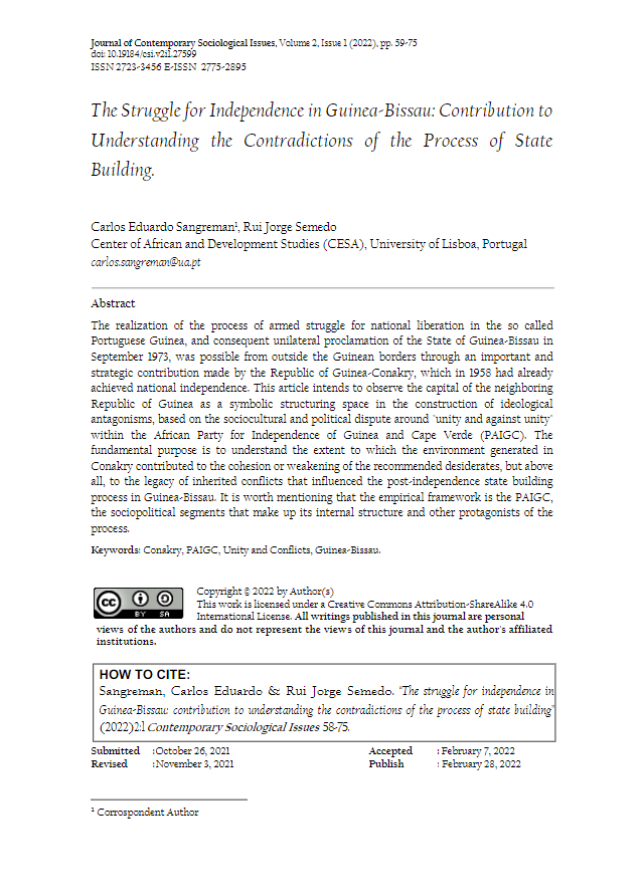
The Struggle for Independence in Guinea-Bissau – Contribution to Understanding the Contradictions of the Process of State Building
Abstract:
The realization of the process of armed struggle for national liberation in the so called Portuguese Guinea, and consequent unilateral proclamation of the State of Guinea-Bissau in September 1973, was possible from outside the Guinean borders through an important and strategic contribution made by the Republic of Guinea-Conakry, which in 1958 had already achieved national independence. This article intends to observe the capital of the neighboring Republic of Guinea as a symbolic structuring space in the construction of ideological antagonisms, based on the sociocultural and political dispute around “unity and against unity” within the African Party for Independence of Guinea and Cape Verde (PAIGC). The fundamental purpose isto understand the extent to which the environment generated in Conakry contributed to the cohesion or weakening of the recommended desiderates, but above all,to the legacy of inherited conflicts that influenced thepost-independence state building processin Guinea-Bissau. It is worth mentioning thatthe empirical framework is the PAIGC, the sociopolitical segments that make up its internal structure and other protagonists of the process.
Quotation:
SANGREMAN, Carlos Eduardo; SEMEDO, Rui Jorge. The Struggle for Independence in Guinea-Bissau. Journal of Contemporary Sociological Issues, [S.l.], v. 2, n. 1, p. 59-75, feb. 2022. ISSN 2775-2895. Available at: <https://jurnal.unej.ac.id/index.php/JCSI/article/view/27599>. Date accessed: 04 may 2023. doi: https://doi.org/10.19184/csi.v2i1.27599.
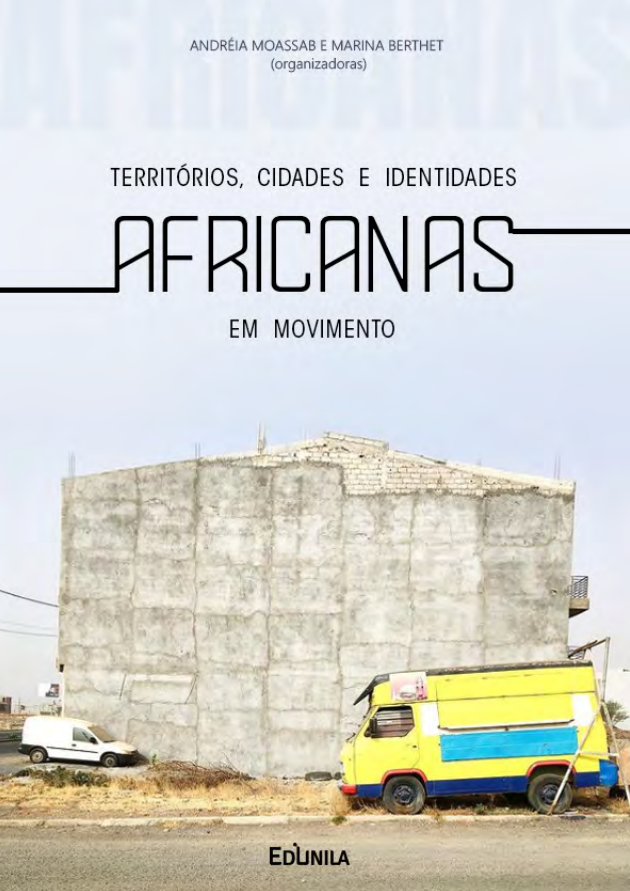
Hip-hop em Cabo Verde: rap e representação do espaço público na cidade da Praia
Abstract:
In Hip-hop em Cabo Verde: rap e representação do espaço público na cidade da Praia, the author studies how, despite the strong link with Portugal and the existence in that country of numerous rap groups composed of Cape Verdeans or descendants of Cape Verdeans, the hip-hop produced there is practically ignored and very little consumed by young people, particularly those from the periphery, to the detriment of the culture of North American black ghettos, known through the audiovisual flows of the digital era. Young people all over the world are seen as a risk factor, an association that is particularly patent in the modern discourse on security, especially in an era in which a part of young people associate themselves with street gangs, revealing “the failure of the expected reproduction of the support mechanisms of an expansive and optimistic capitalism”, which provides the so-called “Welfare State”. Thus, in the face of a feeling of juvenile unease, evidenced in some actions that destabilize the social order and the “Creole morabeza”, it becomes mandatory that the institutions that protect this population layer control them, reprogramming them institutionally, thus building a State Social Service.
Quotation:
Lima, R.W. (2022). Hip-hop em Cabo Verde: rap e representação do espaço público na cidade da Praia: In Territórios, cidades e identidades africanas em movimento. Andréia Moassab, Marina Berthet (Orgs.), 119-133. Foz do Iguaçu: EDUNILA, 2022. ISBN: 978-65-86342-32-1

África, o berço da modernidade: por uma visão pós-colonial da modernidade e do território
Abstract:
In África, o berço da modernidade: por uma visão pós-colonial da modernidade e do território. In Territórios, cidades e identidades africanas em movimento, the author starts by taking a brief look at what is conventionally called modernity and what constitutes the substratum on which the “West” anchors itself for a triumphant and universalist autonarrative. Various authors, mainly from the mid-eighties onwards, have sought to demystify the origins of Western civilisation and modernity, most notably the three volumes of Black Athena: The Afroasiatic Roots of Classical Civilization (1987/1991/2006), by Martin Gardiner Bernal.2 Other authors have followed in Bernal’s footsteps to some extent, one of them being the philosopher and historian Enrique Dussel with his work Política de La Liberación: Historia Mundial y Crítica [Liberation Policy: World History and Critique] (2007): World History and Critique] (2007), in which, situated in the field of postcolonial theory, he argues that Hellenocentrism is the father of Eurocentrism and that, given that the so-called “Greek miracle” by the German Romantics of the eighteenth century does not exist, this means having to start “anew” the history of political philosophy. To this end, he considers it essential to redefine the beginning of modernity. It is worth pointing out that it is “postmodernity” – called the historical period that seeks to overcome, or surpasses, modernity – that will give rise, in Western academia and its satellites, not only to a debate about the “postmodern condition” – or about its being the “cultural logic of late capitalism” – but also about the “vision” of modernity itself. Although many prefer expressions other than “postmodern”, or change their preference -such as Zygmunt Bauman, who starts talking about “liquid modernity”, or Gilles Lipovetsky, who prefers the term “hypermodernity”, or others who talk about “incomplete modernity”, or “late modernity” or “alternative modernities”-, in essence they do not put the emphasis on a critical analysis of the hegemonic Anglo-Saxon periodisation of modernity.
Quotation:
Barros-Varela, O. (2022). África, o berço da modernidade: por uma visão pós-colonial da modernidade e do território. In Territórios, cidades e identidades africanas em movimento. Andréia Moassab, Marina Berthet (Orgs.), 11-31. Foz do Iguaçu: EDUNILA, 2022. ISBN: 978-65-86342-32-1
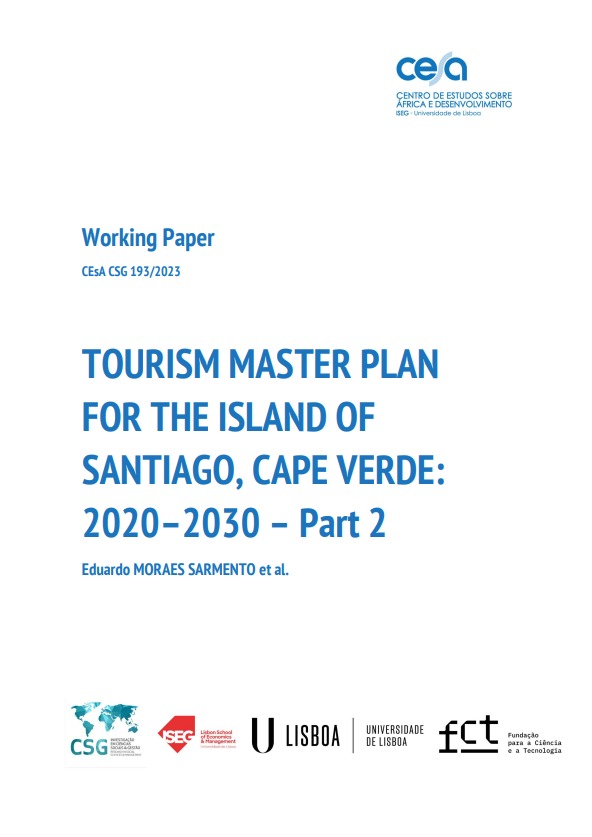
Working Paper 193/2023: Tourism Master Plan for the Island of Santiago, Cape Verde: 2020-2030 – Part 2
Abstract:
Cape Verde, a small insular development economy (SIDS), has been confronted and faces various economic, social and environmental constraints throughout its history that have been conditioning its growth strategy. In recent years, tourism has been growing and consolidating an important contribution to economic development, which is observable in the evolution of the number of nights spent in the country, revenue, number of guests, employment generation, and incentive to exports, among others. The gross added value of tourism currently has a weight that is already more than 20% of its GDP (excluding the COVID-19 pandemic period). Aware of this potential, the government created conditions for a greater use of its effects as a mobilizing factor in the economy, as reflected in various official supporting documents and strategic orientations, such as the Strategic Plan for Sustainable Development, and the Main Options of the Strategic Plan for Sustainable Development for the Tourism Activity. The Government decided that each island or region should develop its own strategic tourism plan (Masterplan). Tourism Master Plan For The Island Of Santiago, Cape Verde : 2020–2030 – Part 2 proposes several main strategic reflections about the Tourism Master Plan for the Island of Santiago in order to improve its competitiveness.
Quotation:
Sarmento, E. M. et al. (2023). “Tourism Master Plan For The Island Of Santiago, Cape Verde : 2020–2030 – Part 2”. Instituto Superior de Economia e Gestão – CEsA/CSG – Documentos de Trabalho nº 193/2023
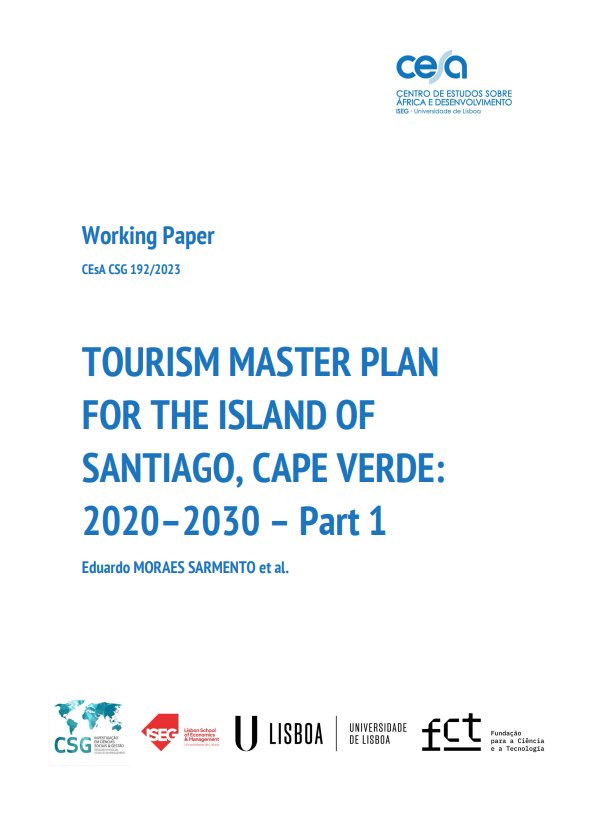
Working Paper 192/2023: Tourism Master Plan for the Island of Santiago, Cape Verde: 2020-2030 – Part 1
Abstract:
Cape Verde, a small insular development economy (SIDS), has been confronted and faces various economic, social and environmental constraints throughout its history that have been conditioning its growth strategy. In recent years, tourism has been growing and consolidating an important contribution to economic development, which is observable in the evolution of the number of nights spent in the country, revenue, number of guests, employment generation, and incentive to export among others. The gross added value of tourism currently has a weight that is already more than 20% of its GDP (excluding the COVID-19 pandemic period). Aware of this potential, the Government created conditions for a greater use of its effects as a mobilizing factor in the economy. Accordingly, various official supporting documents and strategic orientations have been approved, such as the Strategic Plan for Sustainable Development and the Main Options of the Strategic Plan for Sustainable Development for the Tourism Activity. It was also decided that each island or region should develop its own strategic tourism plan (Masterplan). Tourism Master Plan For The Island Of Santiago, Cape Verde: 2020–2030 – Part 1 integrates the main strategic reflections regarding the Tourism Master Plan for the Island of Santiago. Revenue from tourism on the Island of Santiago, where the capital of Cape Verde is located, has been much less than the values of the main islands with a high volume of tourists – Sal and Boa Vista. However, the potential of Santiago is high, and therefore it is necessary to adopt the correct measures required to transform this potential into reality. Therefore, this paper presents a short, medium and long-term vision, with a proposal for strategic objectives that will constitute the anchor on which all operational strategic and objectives that will translate into specific lines of action will be based. In summary, this document proposes a strategy based on a diversified and differentiated touristic offer from the other islands of the country, which maximises its potential, counteracting regional asymmetries and preserving the historical and intangible heritage, as well as the natural resources, with the aim for the whole population to benefit from the resultant economic development, especially the most disadvantaged.
Quotation:
Sarmento, E. M. et al. (2023). “Tourism Master Plan For The Island Of Santiago, Cape Verde: 2020–2030 – Part 1”. Instituto Superior de Economia e Gestão – CEsA/CSG – Documentos de Trabalho nº 192/2023
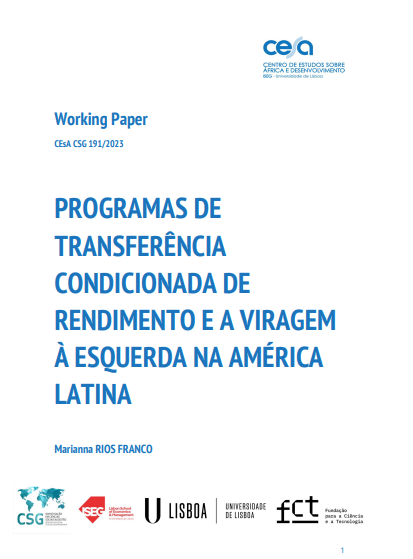
Working Paper 191/2023: Programas de transferência condicionada de rendimento e a viragem à esquerda na América Latina
Abstract:
In the last three decades, two phenomena have emerged and expanded in waves in Latin America: Conditional Cash Transfer (CCT) programs and the arrival of left-wing governments to power. This scenario is set in a historic period of economic recovery in the Region, especially with the “commodity boom”, providing the resources and political space needed to govern on the left and promote social policies. Transferência condicionada de rendimento e a viragem à esquerda na América Latina works with the research hypothesis that left-wing governments were the ones that most created, supported and expanded this type of public policy in Latin America in the period 2000-2020. Thirthy-two CCTs were mapped, implemented by 18 countries in the Region, as well as their presidents and policy guidelines. In addition to reporting on the evolution of the implementation of these policies, this work carried out a quantitative analysis based on IDB and ECLAC databases about the beginning and end of these programs, as well as the evolution of the coverage of beneficiaries. The main conclusions indicate that the hypothesis is only partially and limitedly confirmed. In short, left-wing governments achieved the highest numbers in absolute terms regarding the creation and expansion of CCTs in the region, but centrist governments achieved the highest rates of new programs and increased coverage (in relative terms) – with subtle differences in outcomes between left-wing and centrist governments. Thus, we conclude that the adoption and expansion of CCTs among Latin American countries in the last two decades was largely independent of the political orientation of the governments considered. It was, above all, a regional stake that crossed ideologies, historical moments and economic crises to redistribute income over the last 20 years to more than 100 million people.
Quotation:
Rios Franco, M. (2023). “Programas de transferência condicionada de rendimento e a viragem à esquerda na América Latina“. Instituto Superior de Economia e Gestão – CEsA/CSG – Documentos de Trabalho nº 191/2023
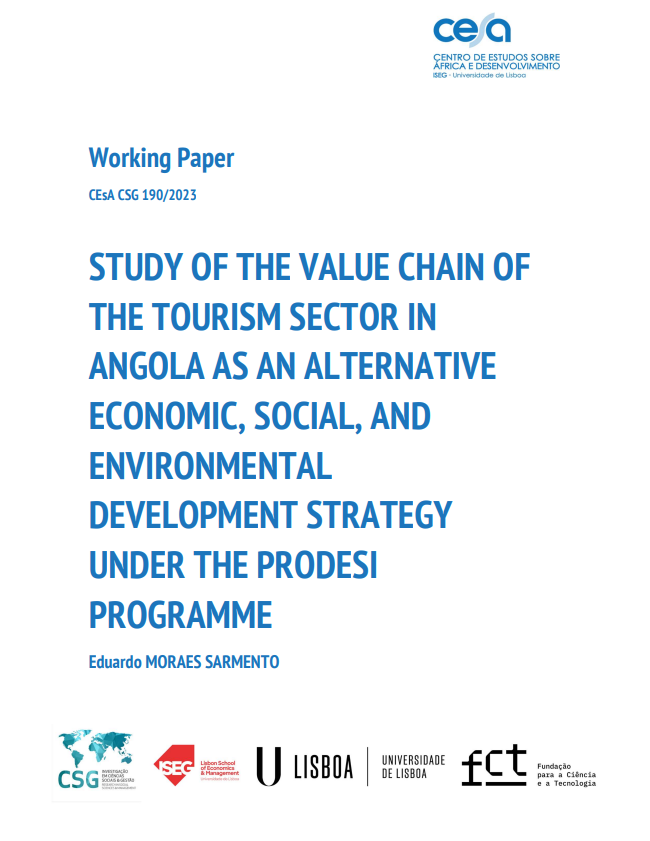
Working Paper 190/2023: Study of the value chain of the tourism sector in Angola as an alternative economic, social, and environmental development strategy under the Prodesi programme
Abstract:
Angola has been facing several economic and social problems, with one of the most important being related to the country’s long tradition of dependency on oil as a major external revenue. Due to this situation, the country’s income has been slowing and there is a need to find alternative strategies to increase the liquidity of the economy without which Angola would lack the necessary funds to increase investment and proceed with adequate policies to combat social exclusion and eradicate the flows of poverty. Aware of this situation, the government implemented the national PRODESI project, whose aim is to accelerate the process of the diversification of the nation’s economy. To this end, the project aims to promote production and exports in the non-oil sectors, as well as in sectors with a strong potential for import substitution. One of these areas is tourism, as a means of developing some of the country’s regions and provinces, and also in order to benefit populations living in worse conditions, whilst diversifying the economic restrictions. The focus of actions in PRODESI foresees that the to accelerate the diversification of the economy, whether through import substitution or through diversification and an increase in exports, will be directed towards the production of goods and services or the implementation of new strategies designed to gain critical mass and create intra and intersectoral relationships, such as in the case of tourism. Accordingly, the purpose of this research is to identify the main weaknesses of the core value chain of tourism and to propose a set of measures and recommendations to be implemented within the scope of PRODESI. The main objective is to ensure that this activity effectively contributes to diversifying Angola’s economy in a sustainable path and that it helps leverage the increase in national production in a faster and more efficient way and thus significantly help decrease the dependency on imports and increase the export basis, which can be achieved through adopting a strategy of diversification, based on both international and national tourism. 3 Methodologically, several studies were consulted and various meetings and in-depth field visits were made, between January and March 2000, in the provinces of Luanda, Malange, Huíla, and Namibe. Several interviews were carried out up until 2021with major players (ranging from ministers through to national directors and other experts) and tourist organizations (Ministries, Travel Agencies, and entrepreneurs). It is estimated that in the next 10 years Sub-Saharan Africa will register a growth in tourism superior to the global average, regardless of the COVID pandemic. Study of the Value Chain of the Tourism Sector in Angola as an Alternative Economic, Social, and Environmental Development Strategy Under the Prodesi Programme concluded that even though tourism in Angola still faces a deficit at several levels, the country nevertheless has a set of natural resources and tourism attributes that, if properly explored and used, could provide an alternative way for the future development of Angola’s society. Angola still faces residual tourism receipts from tourism activity as well as in total international incoming tourists, and therefore Angola’s national government may have a huge opportunity to implement a suitable tourism strategy (both for internal and external flows), in order to not only reinforce its importance but also to benefit the population, fight poverty, and diversify economic activities, as defined in the PRODESI strategy.
Quotation:
Sarmento, E.M. 2023. “Study of the Value Chain of the Tourism Sector in Angola as an Alternative Economic, Social, and Environmental Development Strategy Under the Prodesi Programme“. Instituto Superior de Economia e Gestão – CEsA/CSG – Documentos de Trabalho nº 190/2023
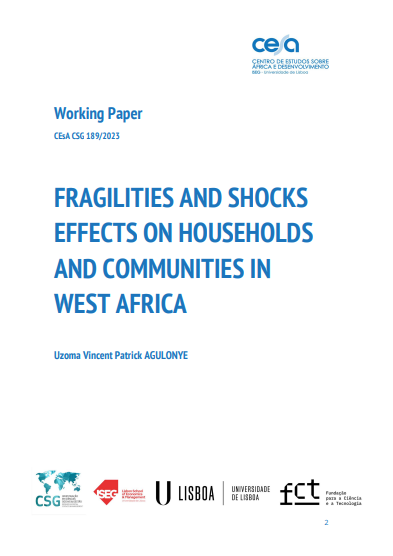
Working Paper 189/2023: Fragilities and shocks effects on households and communities in West Africa
Abstract:
Shocks are drivers of fragility yet most works on fragility in Africa use the tag “fragile state(s)” with less focus on the drivers of fragility in its institutions, states, and economies. Shocks are cardinal to the entrenchment or stability of any system. The Covid-19 pandemic revealed how fragile the world is including the “developed” or “advanced” systems. Today, households, businesses, and communities in most parts of Sub-Saharan Africa suffer the effects of a triple whammy (climate change, the pandemic and Russia/Ukraine War) including effects of history and an unfavourable global system all of which leaves them in hunger, poverty and vulnerable conditions. Fragilities and Shocks Effects on Households and Communities in West Africa used secondary sources to revisit the effects of these shocks on households, and communities in West Africa through the lens of common resources. The recent shocks effects prevalent in all these countries is higher than reported and would affect West Africa´s growing population in the foreseeable future with the absence of safety nets or effective interventions. The absence of shocks preparation in the subregion is not sustainable and adds up to the sustenance of the revolving circle of fragility in the subregion.
Quotation:
Agulonye, U.V.P. 2023. “Fragilities and Shocks Effects on Households and Communities in West Africa“. Instituto Superior de Economia e Gestão – CEsA/CSG – Documentos de Trabalho nº 189/2023
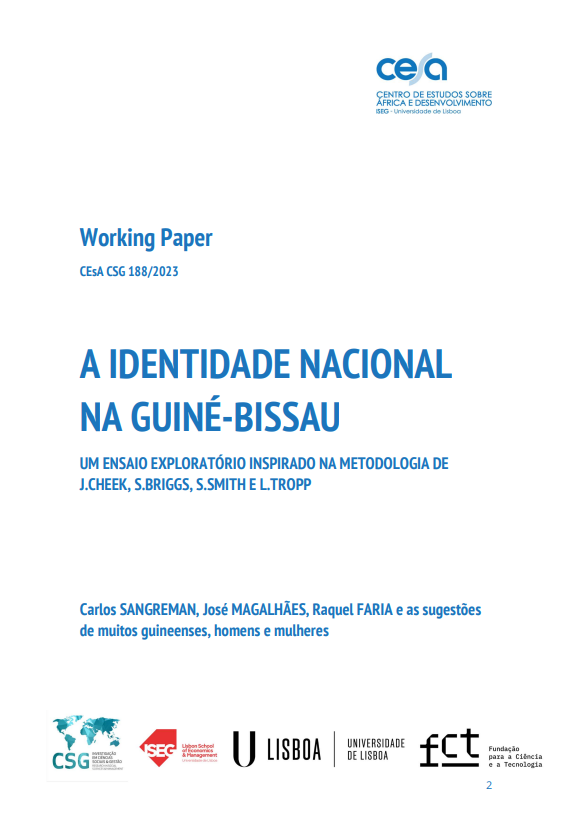
Working Paper 188/2023: A identidade nacional na Guiné-Bissau: um ensaio exploratório inspirado na metodologia de J.Cheek, S.Briggs, S.Smith e L.Tropp
Abstract:
The investigation of A Identidade Nacional na Guiné-Bissau – Um ensaio exploratório inspirado na metodologia de J.Cheek, S.Briggs, S.Smith e L.Tropp is defined as exploratory and aims to evaluate whether the methodology of inquiry and analysis of identity. created by J. Cheek, S. Briggs, S. Smith and L. Tropp, can be adapted to a fragile state like Guinea-Bissau. This methodology consists in the assessment of the importance attributed by the respondents of 70 sentences from which the characteristics of individual and social identity (family and collective) are extracted. The sentences were sent by digital means to 102 Guineans known in person or only by Facebook with request for response and dissemination and obtained 183 responses. These answers, calculated according to the methodology adopted, allowed to define some identity characteristics of the respondents. We tried to interpret these results using other surveys made since 2014 in Guinea-Bissau with different themes. It is concluded by realizing that this is a method that can contribute to the knowledge of the national identity of Guineans, but insufficient. This conclusion remains to be demonstrated if it is carried out with a statistically significant sample.
Quotation:
Sangreman, C., Magalhães, J., Faria, R. (2023). “A Identidade Nacional na Guiné-Bissau – Um ensaio exploratório inspirado na metodologia de J.Cheek, S.Briggs, S.Smith e L.Tropp“. Instituto Superior de Economia e Gestão – CEsA/CSG – Documentos de Trabalho nº 188/2023
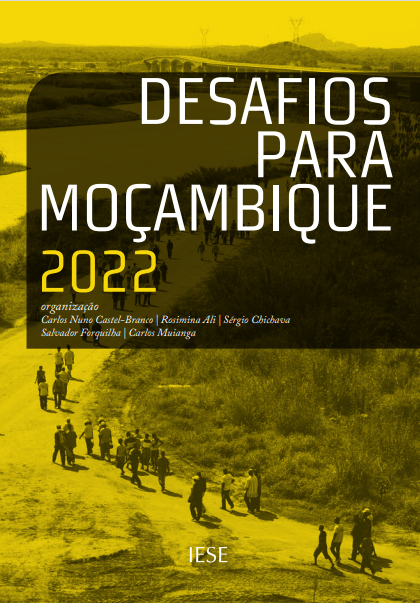
Desafios para Moçambique, 2022
Abstract:
This issue of Desafios para Moçambique (2022) comes as the country faces enormous challenges – the war in Cabo Delgado, with some signs of expansion into other provinces; the Rovuma basin gas extraction and liquefaction projects, which realise some 24 Challenges for Mozambique 2022 Introduction of the greatest challenges in Mozambique’s economic history; the lingering effects of the global crisis, the bursting and implosion of the economic bubble, of which the sovereign debt crisis was a manifestation, and the social and economic after-effects of the covid-19 pandemic. These challenges and crises stimulated research and resulted in lessons, some of which are developed in this issue. Recently ended in Maputo, the trial of some of the state agents and private agents involved in the illicit international financial transactions that resulted in the odious debts. What was already clear before – that these illicit transactions are a reflection of more general dynamics of expropriation, privatisation and financialisation of the state for private accumulation of capital, even if this is done at heavy social costs – has, if possible, become clearer. The hypothesis that the legal process, which we had the opportunity to follow for about a year and a half, only touched on the recipients of commissions for corruption and influence peddling, the executors of the great default against the public purse, was confirmed.
Quotation:
Castel-Branco, C.N., Ali, R., Chichava, S., Forquilha, S., Muianga, C. (2022) Desafios para Moçambique, 2022. IESE. Maputo, Moçambique. ISBN: 978-989-8464-58-3





